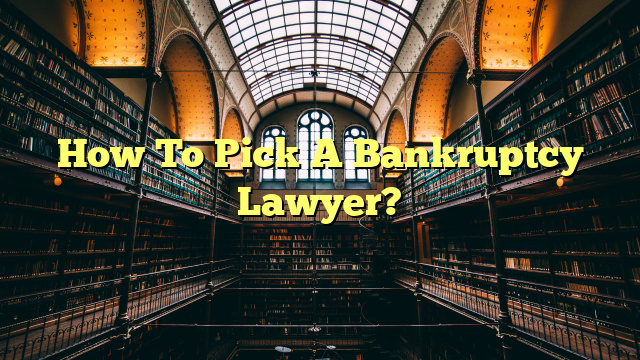Table of Contents
- 1. Determine Your Needs
- 2. Check for Qualifications
- 3. Ask for Referrals
- 4. Research Lawyers Online
- 5. Interview Potential Attorneys
- 6. Make Your Decision
Filing for bankruptcy is not a decision to take lightly. It requires careful consideration and the right team of professionals assisting you. Choosing the right bankruptcy lawyer is an important part of the process.
Bankruptcy attorneys have specialized knowledge and experience with bankruptcy law. An experienced attorney can help you organize the necessary documents, provide you with the right advice, and represent you in court. To make the right choice, consider the following advice.
1. Determine Your Needs
Before you start looking for an attorney, you should know what kind of bankruptcy filing you need. There are two types of bankruptcy proceedings: Chapter 7 and Chapter 13. There are also special bankruptcy filings for farmers and businesses.
Chapter 7 bankruptcy is the most common type of bankruptcy filing for individuals who can no longer pay their debts. It involves liquidating assets to pay off creditors. Chapter 13 bankruptcy is for individuals who have a reliable source of income and some assets, and it involves restructuring debt payments and consolidating them into a single monthly payment.
You may also need to determine whether you are eligible for bankruptcy. Depending on your state and the type of bankruptcy you want to file, there are certain income and debt limitations you must adhere to. You should also be aware of any mandatory debt counseling or credit counseling requirements.
2. Check for Qualifications
Once you have determined your needs and the type of bankruptcy filing you are eligible for, you should search for qualified attorneys. Attorneys who practice bankruptcy law should have a certification from the American Bankruptcy Institute, which is a professional organization dedicated to representing and educating bankruptcy professionals.
You should also look for attorneys who are in good standing with the American Bar Association and the state bar association in your state. Check to see if the attorneys you are considering have any disciplinary actions against them.
3. Ask for Referrals
Once you have narrowed down your list of qualified attorneys, you should ask friends and family members for referrals. Ask them if they know any attorneys who specialize in bankruptcy law and if they can recommend any. You can also contact your local bankruptcy court and ask them to provide you with a list of qualified attorneys.
4. Research Lawyers Online
Once you have a few names of potential attorneys, you should research them online. Check their websites for more information about their qualifications, experience, and fees. Read online reviews to get an idea of the attorneys’ reputation in the community.
You should also look for any articles or videos they have written or produced related to bankruptcy law. This will give you an understanding of their knowledge and experience in the field.
5. Interview Potential Attorneys
Once you have identified a few qualified attorneys, you should contact them for an initial consultation. This is usually free or a nominal fee. During the consultation, you should ask questions about their experience, fees, and their approach to your case. Be sure to get a clear understanding of their rate structure and any other fees they may charge.
You should also ask them how they will communicate with you throughout the process. Make sure they are willing to provide you with regular updates and that you can get in touch with them if you have any questions or concerns.
6. Make Your Decision
After the initial consultations, you should compare the attorneys you interviewed. Consider their qualifications, fees, and the rapport you had with them. Make sure you feel comfortable with the attorney you choose and that you are confident in their ability to successfully handle your


Finding an experienced bankruptcy lawyer is essential for navigating this stressful process. Research, interviews and qualifications checks are key to ensuring you make the best choice.
It can be difficult to decipher which bankruptcy lawyer is best suited for your needs. I’d caution against hasty decisions and suggest allowing time to consider all possible options.